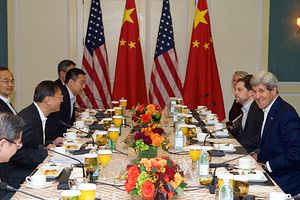A democratic China would be a nightmare for the West, according to a leading former Southeast Asian former diplomat.
One of the paradoxes for the West is that it is better off with the Chinese Communist Party (CCP) in power in China, Kishore Mahbubani, the Dean of the Lee Kuan Yew School of Public Policy of the National University of Singapore and that country’s former UN ambassador, told a D.C. audience on Tuesday.
Noting that the general consensus in the United States has long been that a liberal democratic China would be a more responsible global power, Mahbubani warned Americans to be careful what they wish for.
“There is a strong nationalist sentiment in China” that derives from the view that China suffered a century of humiliation at the hands of Western and other foreign powers, Mahbubani pointed out. This sentiment is not relegated to the fringe of society; in fact, this conviction is often strongest among highly educated Chinese elites, especially those who have studied abroad in places like the United States and Europe.
The CCP currently keeps this nationalist sentiment in check, Mahbubani said. These forces would be unleashed, however, if China became a liberal democracy, which would be a “nightmare” for the Western world.
“I have no doubt that doubt China as a liberal democracy would be a much more nationalist, much more dangerous country” because “200 years of pent up anger” would explode, Mahbubani predicted.
By contrast, the CCP is more interested in domestic issues, which are the key to its survival, Mahbubani argued. He also said that CCP leaders believe that time is on China’s side and thus see little reason to aggressively challenge the established global order. The paradox, then, according to Mahbubani, is that China is most likely to play the role of a responsible stakeholder in the global order if it remains under the control of the Chinese Communist Party.
“If you are interested in global peace and security you may want to see the Chinese Communist Party remain in power,” Mahbubani told the largely American audience.
Indeed, Mahbubani added that “China has no interest in disrupting the global order” and on most global issues it is likely to continue deferring to the leadership of other countries for the foreseeable future. He did concede that this is not necessarily the case for important regional issues like North Korea and the South China Sea, where China is already more actively asserting itself.
Mahbubani was speaking at a luncheon hosted by the Center For The National Interest in Washington, DC.
While noting that predicting the future is wrought with challenges, Mahbubani also argued that it is nearly inevitable that China’s economy will surpass America’s on a non-PPP basis in the near future, making China “number one” in the world.
“It is possible China may stumble and fall…. We cannot rule it out” but it’s unlikely to happen given China’s “enormous stock of human capital.” This will allow it to maintain an annual average growth rate of 6-7 percent for the foreseeable future, Mahbubani said, which is all it needs to surpass the United States.
Given this, the former ambassador said, it is surprising that there aren’t far more discussions about how the world will change when China becomes number one. However, Mahbubani noted that this is unlikely to occur in the United States because it is “political suicide” for any American leader to openly contemplate a future where the U.S. is number two.
































